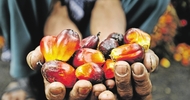The land grab phenomenon in Sudan...resembles a fata morgana, a mirage in the desert which completely distorts the object on which it is based
"Investing in Farmland and Feeding the World," was discussed at an interactive session at the 65th CFA Institute Annual Conference in Chicago last week.
- Seeking Alpha
-
17 May 2012
Land is the missing element at next month's big UN sustainable development summit known as Rio+20, where nations of the world will meet June 20-22 with the goal of setting a new course to ensure the survival and flourishing of humanity.
India, which doesn’t allow corporate farming domestically, has joined the growing list of countries going overseas to look for food security.
- Asia Sentinel
-
09 April 2012
Alfred Quayjandi accuses both the Liberian government and Sime Darby of presenting a confused and angry population with a fait accompli, failing to consult local communities and bypassing or snubbing the local administration and traditional chiefs.
- AllAfrica
-
29 February 2012
The scariest aspect of this unfolding phenomenon is that despite the foreseeable terrible consequences, the appetite among the rich countries to own a piece of this developing-country fertile land continues to grow, turning to an ugly competition.
- Peace & Conflict Monitor
-
29 February 2012
A new report by Greenomics Indonesia documents how the Merauke Integrated Food and Energy Estate threatens peatland and forest in Papua province, Indonesia.
- REDD Monitor
-
17 February 2012
The Canadian–based businessman has increased his Marion County land holdings in the past two years nearly sixfold, making him the largest private property owner in the county with 29,000 acres.
The global rush to acquire large amounts of land in developing countries has done more harm than good, especially to the poorest people who often lose access to land and resources essential to their livelihoods.
- AlertNet
-
14 December 2011
Multinational corporations are buying enormous tracts of land in Africa, putting countries on the path to increased food insecurity, environmental degradation, increased reliance on aid and marginalisation of farming and pastoralist communities.
- Pambazuka
-
03 November 2011
New book explains the reasons behind the land grab phenomenon and why so many Ethiopians are not only alarmed but also adamantly opposed to it.
- Ethiopian Review
-
11 October 2011
Panel of five men at the at the Global Economic Symposium in Kiel, Germany discusses the problem of “land grabbing”.
- Economic Insights
-
06 October 2011
Unfortunately, given the global nature of capital, even if the US were to completely shut down speculation, it would just move offshore.
- AlterNet
-
23 September 2011
Land is a powerful commodity that should be used for the betterment of humanity through farming and ecology.
Smallholding income can be far more productive for rural areas than export orientated or foreign-owned large farms because any income earned is spent in the rural area.
While Brazil touts its efforts to slow destruction of the Amazon, another biodiverse region of the country is being cleared for large-scale farming. But unlike the heralded rainforest it borders, the loss of the cerrado and its rich tropical savanna so far has failed to attract much notice.
Farm Lands of Guinea Limited controls nearly a quarter of a million acres of underutilized West African agricultural holdings under an agreement with the Ministry of Agriculture of Guinea.
I urge the Government to stop conceding to foreigners the natural resources and the national reserves of the peoples of Ethiopia, and to begin helping Ethiopian farmers preserve and farm their lands organically.
Principles for responsible agriculture investment are stock templates, designed to deflect the fallout from a growing number of media reports of land deals between investors and governments.
The final version of the appeal is open for endorsement on-line until March 31, 2011
- Online petition
-
25 February 2011
"We have set up a global food system that supports speculation. And with [such] markets, we can't get speculators out of the food business," said Lester Brown, an agricultural policy expert and founder of the Washington-based Earth Policy Institute.
The shift of power in Australia’s Federal Parliament, which is now largely in the hands of a few independents representing rural and regional constituencies, combined with the increasingly vocal calls for scrutiny of foreign investment has sent signals of a more protectionist stance for Australian agriculture.
- Lexology
-
16 December 2010
The Egyptian external agricultural land deals are all the more fragile as a future government or policy change in Ethiopia or Sudan risks destabilizing their external food security strategy.
- Afrik News
-
14 October 2010
News of progress on the massive Merauke food estate in Papua indicates growing momentum behind Indonesia’s attempts to boost its agricultural output through promoting investment and harnessing technology.
- Jakarta Post
-
04 October 2010
To speak only of the ‘threats and potential opportunities’ that these investments highlight leaves underexposed the grave risks to human rights that they pose, writes Dr. Margot Salomon, from the London School of Economics
- Al Majalla
-
04 August 2010
Global Witness proposes how the FAO Voluntary Guidelines on responsible governance of land tenure can best address the macroeconomic impacts of corruption and governance failures in large scale land acquisitions.
- Global Witness
-
15 July 2010
World Bank and UN's seven Principles for Responsible Agricultural Investment are "woefully inadequate" says UN Special Rapporteur on the right to food.
- Project Syndicate
-
04 June 2010
Groups issue sign-on letter calling on the World Bank to stop funding oil palm plantations.
When will governments recognise the immense potential of their own farmers and their sustainable, diverse family farming systems, that are so desperately in need of genuine 'responsible' agricultural investment to assure food and seed sovereignty, asks Joan Baxter
New report by Oakland Institute exposes the role of the World Bank’s private sector branch, International Finance Corporation, in fueling land grabs.
- Oakland Institute
-
26 April 2010
